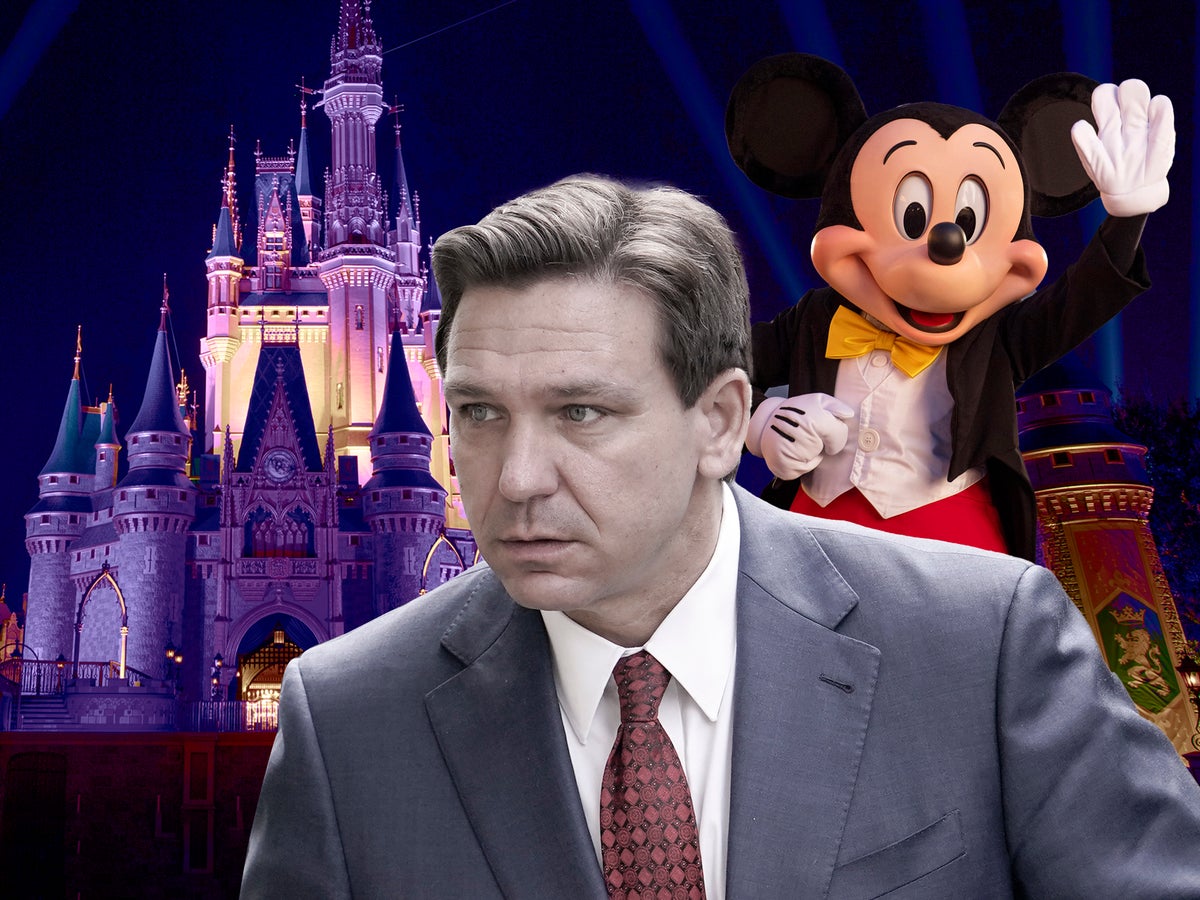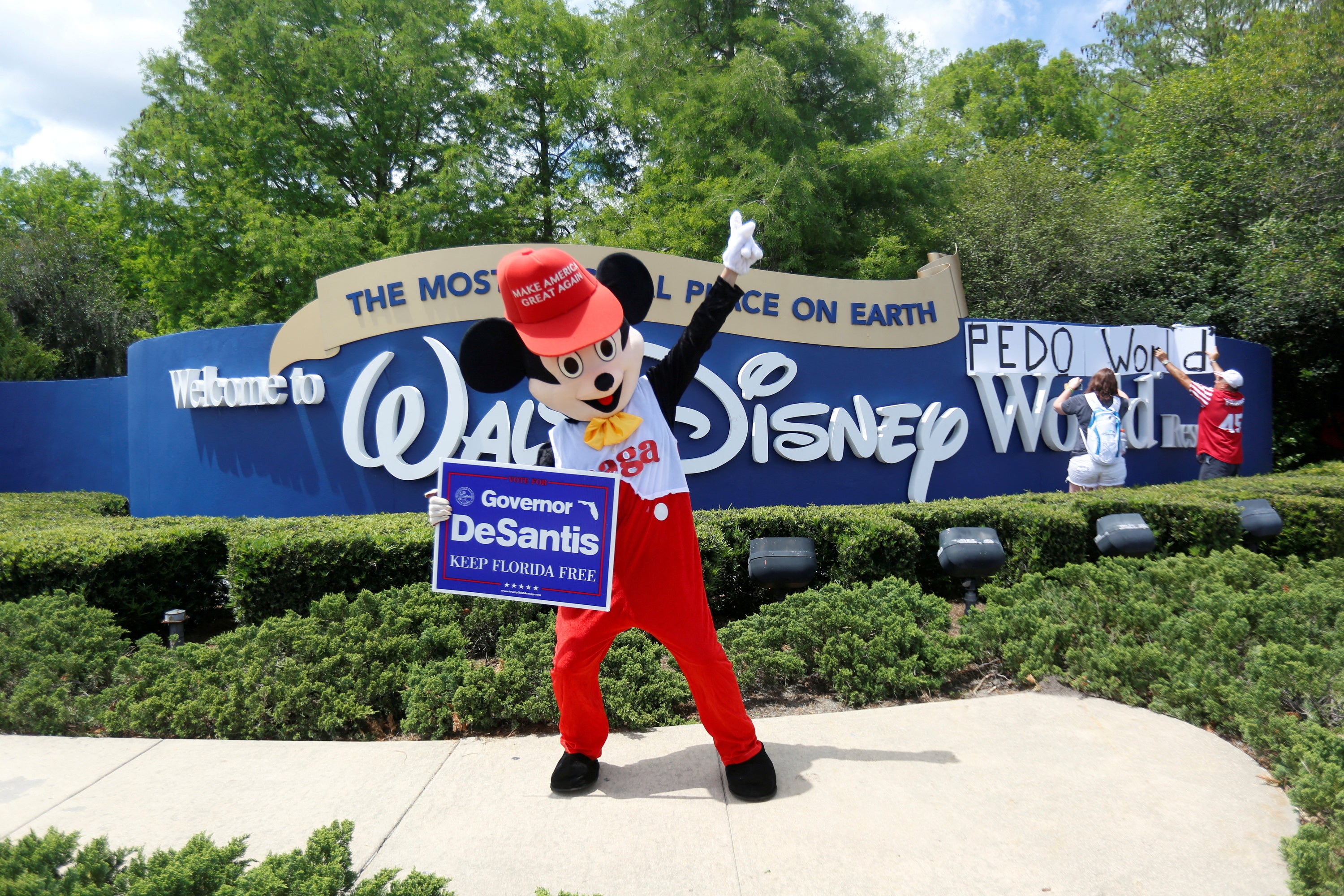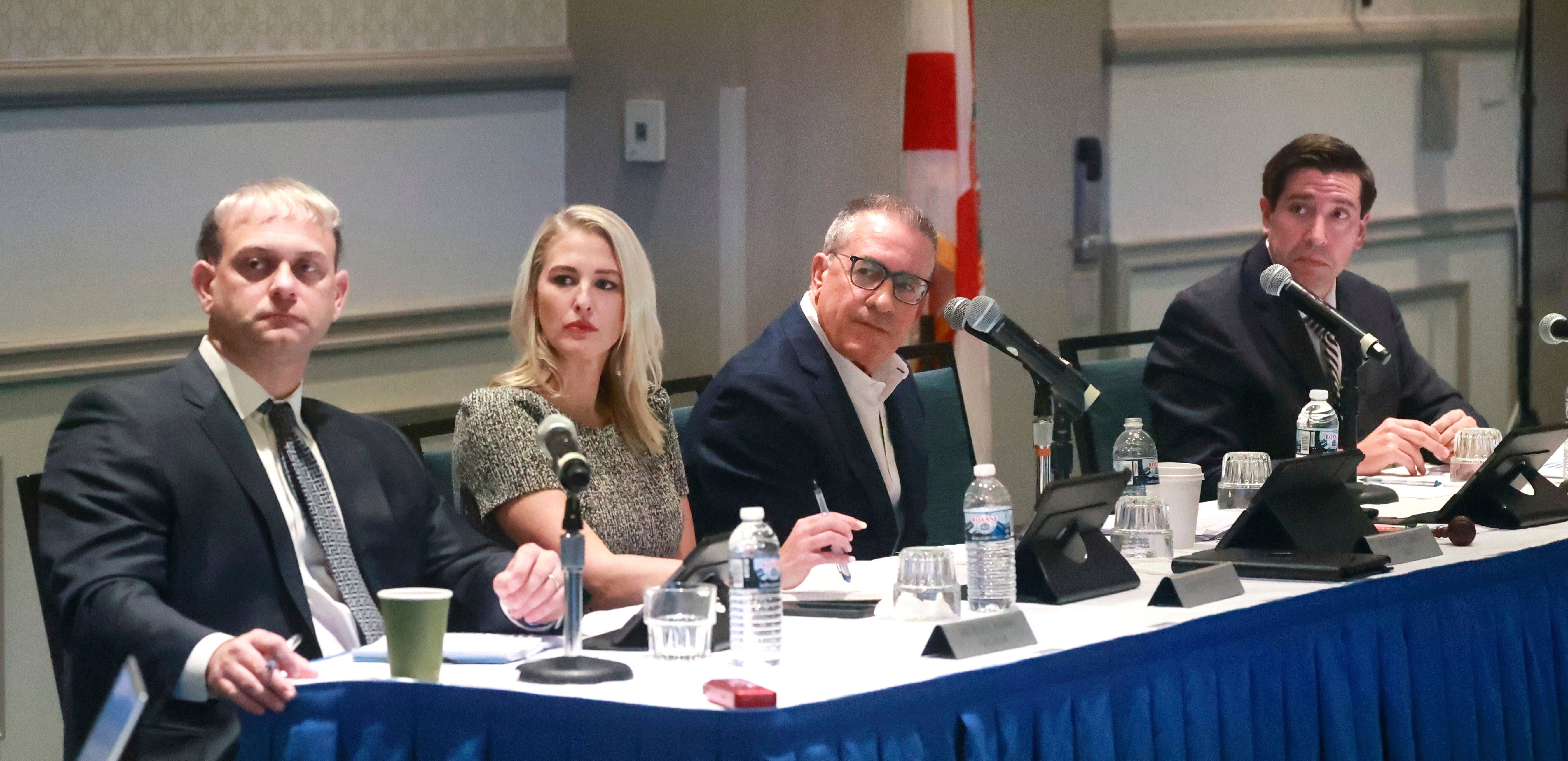
For years, Florida legislators and the governor’s office enjoyed a close relationship with The Walt Disney Company, among the state’s largest employers, wielding enormous political influence while bringing in billions of dollars to the state each year.
Now, the company and allies of Republican Governor Ron DeSantis are suing one another, following a year-long feud over opposition to what opponents have called Florida’s “Don’t Say Gay” law that boiled over into political and legal battles that could shape the company’s business in the state.
The state’s feud with the company is entangled with volatile far-right attacks smearing Disney and LGBT+ people as “groomers” and “paedophiles,” while similar threats to LGBT+ people are making their way through state legislatures and governor’s offices across the country.
Last year, Mr DeSantis endorsed a broadly written bill from Republican lawmakers – the “Parental Rights in Education Act” – that prohibits instruction of “sexual orientation or gender identity” from kindergarten through the third grade and any such discussion “that is not age-appropriate or developmentally appropriate for students” in other grades.
LGBT+ advocates and civil rights groups warned that the measure’s broad scope could freeze classroom speech involving LGBT+ people and issues – from civil rights history lessons to discussions with students, school staff and their families – under the threat of potentially financially destructive litigation and harassment from third parties who accuse schools of violating the law.
Following passage of the bill, more than three dozen similar measures have been proposed in nearly half of US states, including 26 measures in 14 states in their current legislative sessions alone.
Meanwhile, the governor has launched his campaign for the 2024 Republican nomination for president while immersed a political battle with one of the state’s top employers.
Here is how – as Disney writes in a recent lawsuit – “it has come to this.”
Disney faces pressure to respond to ‘Don’t Say Gay’ threats
Disney is a political heavyweight in the state. The company dispatches several lobbyists to the state capitol in Tallahassee and gives millions of dollars through its many entities to both Democratic and Republican officials every election cycle to promote its business.
It’s also a cultural and economic powerhouse, drawing millions of visitors to the state each year. The company’s voice on controversial legislation could, until recently, carry significant weight.
But reporting from The Independent and other outlets found that Disney entities contributed tens of thousands of dollars to Mr DeSantis and other Republican lawmakers central to the “Don’t Say Gay” law, despite the company’s history of LGBT+ advocacy.
In February 2022, Bob Iger – just weeks into his retirement from Disney leadership – announced that if the bill passed, it will “put vulnerable, young LGBTQ people in jeopardy.”
Eleven days later, facing pressure from LGBT+ advocates and Disney employees, now-former CEO Bob Chapek issued a company memo stating that “corporate statements do very little to change outcomes or minds” while asking staff to not “mistake a lack of a statement for a lack of support.”
On 11 March, 2022, Mr Chapek announced that the company would oppose the bill and suspend its political donations in the state.

He stated that the company would “immediately” begin supporting efforts to combat similar legislation elsewhere and pause “all political donations” in the state pending a review of the company’s political giving, conceding that the company failed to “be a stronger ally in the fight for equal rights”.
The company’s LGBT+ employees and staff opposed to the legislation staged daily walkouts to pressure Disney to indefinitely cease all campaign donations to state officials who created or helped pass the measure and demand that Disney leadership publicly commit to an actionable plan that protects employees from anti-LGBT+ legislation. The actions culminated in a full workday walkout or “sick out” on 22 March.
“Our goal as a company is for this law to be repealed by the legislature or struck down by the courts, and we remain committed to supporting the national and state organisations working to achieve that,” the company said on 28 March 2022, when the governor signed the bill into law.
Governor DeSantis and members of his administration quickly lashed out at the company, igniting a feud that escalated to Republican threats to punish its operations in the state.
By the end of that year, Mr Iger returned to Disney as CEO.
DeSantis pushes for the end of Reedy Creek
In April 2022, Governor DeSantis expanded the scope of a special legislative session on the state’s redistricting plans to also consider the “termination of all special districts that were enacted in Florida prior to 1968,” including the municipal taxing and government district that allows Disney to tax and regulate its sprawling park and resort properties in the Orlando area.
The Reedy Creek Improvement District was first created in 1967 to give Disney control of its land use, zoning rules and public services without putting a tax burden on Florida residents.
The district encompasses Disney World properties in Bay Lake and Lake Buena Vista, spanning 39 square miles and land across Orange and Osceola counties.
With Disney as the primary landowner for the district, the company is largely responsible for all costs of those municipal services that otherwise would fall under the jurisdiction of county and local governments, including the taxpayers who live within them. In effect, Disney used the Reedy Creek board to tax itself to foot the bill for all of its municipal needs.
The governor and Republican lawmakers wanted to blow up that arrangement.
On 19 April 2022, Republican state Rep Randy Fine introduced House Bill 3C, the “Independent Special Districts” bill. A companion measure, Senate Bill 4C, was introduced in the state Senate.
The governor and his administration insisted that the initial proposal was intended to block what they called “special privileges” for big business in the state, but fundraising messages promoting Reedy Creek’s demise pointed to Disney’s “woke” opposition to the so-called “Don’t Say Gay” bill.
“Disney thought they ruled Florida,” an email from his campaign on 19 April said. “They even tried to attack me to advance their woke agenda. Now, parents see Disney for what it is. And now is the time to put the power back in the hands of Floridians and out of the pockets of woke executives.”
State lawmakers bristled over the governor’s initial plans to dissolve Reedy Creek over concerns that doing so would not only violate state law but force Florida taxpayers to pay for infrastructure projects like road construction that Disney was effectively paying for through the district’s arrangement.
Instead, the governor’s own appointees will be in charge of the district and its powers to tax, build and borrow money under a new “Central Florida Tourism Oversight District”.

During an event on 27 February, Governor DeSantis signed a bill that amounts to a state takeover of the new district, with a five-member board made up of his own appointees.
“Today, the corporate kingdom finally comes to an end,” the governor said inside a Reedy Creek fire station in Lake Buena Vista that day. “There’s a new sheriff in town and accountability will be the order of the day.”
Orlando-area Democratic state representative Anna Eskamani said in a statement that it is “absolutely wild to see a self-proclaimed capitalist like DeSantis celebrate the government takeover of a private board”.
“All this bill does is rename Reedy Creek and allow Governor DeSantis to appoint hostile conservative cronies to a new board,” she said. “Disney still maintains the same tax breaks – but their First Amendment rights have been suppressed, and it sends a message to any private individual or company that if you don’t purport to what the governor wants, then you’ll be punished.”
DeSantis appointees take control
Among the governor’s controversial appointees include a donor who gave the DeSantis campaign $50,000 in 2022 and supported the governor’s efforts to remove an elected state attorney from office.
The governor also appointed the CEO of a right-wing ministry, and the founder of the right-wing activist group Moms for Liberty which the governor has supported to transform local school boards.
Board member Ron Peri, CEO of The Gathering USA ministry, was captured in a since-deleted YouTube video suggesting tap water has turned Americans gay.
“So why are there homosexuals today? There are any number of reasons, you know, that are given. Some would say the increase in estrogen in our societies. You know, there’s estrogen in the water from birth control pills. They can’t get it out,” Mr Peri said in the video, according to CNN. “The level of testosterone in men broadly in America has declined by 50 points in the past 10 years. You know, and so, maybe that’s a part of it.”
Despite public notice of proposed changes before the new board stepped in, the governor’s appointees were outraged to find the Reedy Creek board approved new agreements to make major changes at Disney’s campus, changes that would remain in effect for years to come.
Then came the lawsuits
Moments after the new board voted to strip control of its Florida resort, the company filed a federal lawsuit against the governor and state officials alleging a “targeted campaign of government retaliation”.
On 26 April, the board voted to nullify those agreements, the “latest strike” from Mr DeSantis, according to the lawsuit.
“Disney regrets that it has come to this,” the lawsuit states.
“At the governor’s bidding, the state’s oversight board has purported to ‘void’ publicly noticed and duly agreed development contracts, which had laid the foundation for billions of Disney’s investment dollars and thousands of jobs,” the complaint alleges. “This government action was patently retaliatory, patently anti-business, and patently unconstitutional.”

The lawsuit also quotes the governor’s other retaliatory statements directed towards the company, including weighing potential new taxes and tolls on its hotels and roads and the possibility of a “state prison” near the parks.
A statement from the governor’s communications director Taryn Fenske shared with The Independent said that “we are unaware of any legal right that a company has to operate its own government or maintain special privileges not held by other businesses in the state”.
“This lawsuit is yet another unfortunate example of their hope to undermine the will of the Florida voters and operate outside the bounds of the law,” the statement added.
Disney CEO Bob Iger hinted at the company’s case against the board when he told shareholders in April “the company has a right to freedom of speech just like individuals do”.
“The governor got very angry about the position that Disney took, and it seems like he’s decided to retaliate against us... in effect, to seek to punish a company for its exercise of a constitutional right,” Mr Iger said. “And that just seems really wrong to me – against any company or individual, but particularly against a company that means so much to the state that you live in.”
It didn’t take long for the Central Florida Tourism Oversight District to respond.
On 1 May, days after Disney’s federal lawsuit was filed, the board unanimously agreed to sue the company in state court.
Disney fights back
On 18 May, the company announced that it was pulling the plug on a $1bn office complex in Florida, following through on a warning from Disney leadership that billions of dollars in projects were potentially on the line with the governor’s feud.
The development scheduled for construction was set to bring 2,000 jobs to the region, with 1,000 employees expected to relocate from southern California.
In an email to employees, Disney’s theme park and consumer products chair Josh D’Amaro pointed to “changing business conditions” for the cancellation of the 60-acre Lake Nona project.
“I remain optimistic about the direction of our Walt Disney World business,” he added, noting that the company has still planned $17bn in projects over the next decade at its Disney World campus. “I hope we’re able to,” he said.
A ranking from Axios and Harris Poll that guages the reputations of the most visible brands in America places Disney at No 77 with a score of 70.9, or “good,” falling 12 points from an earlier report.
This story was initially published on 1 May and has been updated with developments






